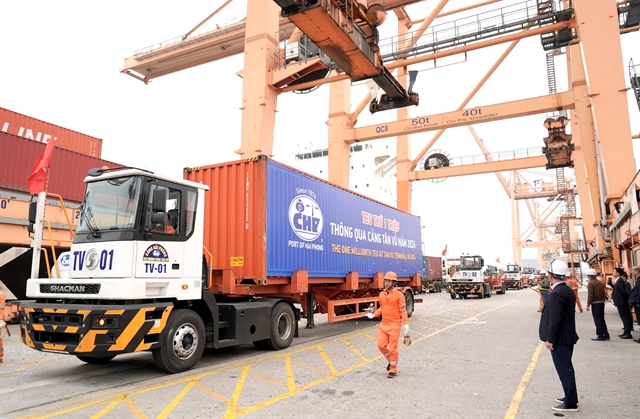 Economy
Economy

 |
| Goods loaded at Tân Vũ Port in Hải Phòng City. Shipping lines operating in Việt Nam pay local seaports loading and unloading fees amounting to just 40 per cent of the THC they collect. — VNA/VNS Photo |
HÀ NỘI — In the past ten years, container handling surcharges and terminal handling charges (THC), levied by foreign shipping lines on cargo owners, have seen a significant rise, increasing nearly 50%, according to the Việt Nam Ship Agents and Brokers Association (Visaba).
In 2013, THC fees for cargo handled at Vietnamese ports were around US$90 for a 20-foot container and $140 for a 40-foot container. By 2023, these figures had risen to approximately $125 and $195, respectively.
THC is a surcharge applied by shipping lines to offset the cost of cargo handling at ports, including the cost of moving containers between the staging yard and the wharf.
While this surcharge is standard practice internationally, recent data reveals a notable discrepancy in proportion of the THC paid to ports in Việt Nam compared to neighbouring countries.
According to Visaba, shipping lines operating in Việt Nam pay local seaports loading and unloading fees amounting to just 40 per cent of the THC they collect. On average, while cargo owners are charged $173 per container, ports receive only about $69.
In contrast, at regional ports in Thailand and the Philippines, shipping lines pay a higher proportion of THC to the ports, around 72 per cent and 73 per cent, respectively. Even in Singapore, where operational costs are typically higher, the figure is still 58 per cent.
This gap has raised concerns among industry experts. With over 90 per cent of Việt Nam’s import and export cargo moved by foreign shipping lines, primarily the top 10 global carriers, these surcharges have become a substantial source of profit for international operators.
A Visaba representative warned that, due to a lack of oversight, foreign carriers have been able to increase surcharges without clear justification, particularly during periods of market fluctuation.
There have been instances in which THC charges were raised by 10–20 per cent, the representative noted.
In some cases, when global freight rates dropped sharply, even turning negative, shipping lines maintained high surcharge levels to compensate for lost revenue.
Alongside THC, cargo owners also face numerous other surcharges, including fees for container imbalance, fuel price adjustments, and cleaning.
Circular 31/2024 was issued to amend previous regulations and strengthen price management mechanisms at seaports.
The circular mandates price declarations for various services such as container loading/unloading, and cleaning and handling of dry, bulk and liquid goods. These measures aim to ensure greater transparency and fairness in port-related charges.
Visaba has called for more coordinated regulatory oversight, suggesting that Vietnamese authorities consider engaging international consultants to audit and regulate THC and other surcharges imposed by foreign carriers. — VNS




